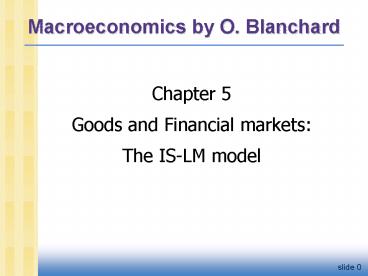Macroeconomics by O' Blanchard - PowerPoint PPT Presentation
1 / 33
Title:
Macroeconomics by O' Blanchard
Description:
Deriving the IS curve ... (b) The LM curve. 12. How the Fed raises the interest ... The feds policy and the LM curve. 31. The Fed's policy instrument ... – PowerPoint PPT presentation
Number of Views:443
Avg rating:3.0/5.0
Title: Macroeconomics by O' Blanchard
1
Macroeconomics by O. Blanchard
- Chapter 5
- Goods and Financial markets
- The IS-LM model
2
Learning Objectives
- The IS curve
- The LM curve
- Fiscal and monetary policy in the IS-LM model
3
Deriving the IS curve
- Def All combinations of r and Y that result
in the goods market equilibrium. - The goods market equilibrium
- YC(Y-T)I(Y,i)G
4
The equilibrium value of income
E planned expenditure
E Y
E
income, output, Y
5
An increase in the demand for goods
E Y
6
Deriving the IS curve
E Y
E C I (r2 )G
E C I (r1 )G
Y2
Y1
r1
r2
IS
Y2
Y1
7
The IS curve and the Loanable Funds model
(a) The L.F. model
(b) The IS curve
r2
r2
r1
r1
IS
8
Shifting the IS curve ?G
E Y
E2
E1
Y2
Y1
r1
IS2
IS1
Y2
Y1
9
Exercise Shifting the IS curve
- Use the diagram of the Keynesian Cross or
Loanable Funds model to show how an increase in
taxes shifts the IS curve.
10
Equilibrium
r interest rate
r1
L (r )
M/P real money balances
11
The LM curve
The equation for the LM curve is
12
Deriving the LM curve
(a) The market for real money balances
(b) The LM curve
r2
r2
r1
r1
13
How the Fed raises the interest rate
r interest rate
r2
r1
L (r )
M/P real money balances
14
How ?M shifts the LM curve
(a) The market for real money balances
(b) The LM curve
r2
r2
r1
r1
15
Exercise Shifting the LM curve
- Suppose a wave of credit card fraud causes
consumers to use cash more frequently in
transactions. - Use the Liquidity Preference model to show how
these events shift the LM curve.
16
The short-run equilibrium
Equilibrium interest rate
Equilibrium level of income
17
An increase in government purchases
18
A tax cut
19
Expansionary Fiscal Policy
20
Contractionary Fiscal policy
21
Monetary Policy an increase in M
22
Interaction between monetary fiscal policy
- Model up to now, we have studied monetary
fiscal policy independently, holding other
exogenous variables constant. - Real world Monetary policymakers may adjust M
in response to changes in fiscal policy, or
vice versa.
23
The Feds response to ?G gt 0
- Suppose Congress increases G.
- Possible Fed responses
- 1. hold M constant
- 2. hold r constant
- 3. hold Y constant
- In each case, the effects of the ?G are
different
24
Response 1 hold M constant
25
Response 2 hold r constant
r2
r1
26
Response 3 hold Y constant
r2
27
Estimates of fiscal policy multipliers
- from the DRI macroeconometric model
Estimated value of ?Y / ?G
Estimated value of ?Y / ?T (?T lt0)
Assumption about monetary policy
Fed holds money supply constant
0.60
0.26
Fed holds nominal interest rate constant
1.93
1.19
28
CASE STUDY The U.S. economic slowdown of 2001
- - What happened
- Shocks that contributed to the slowdown and their
consequences according to the ISLM model - The Policy response and their effect according to
the ISLM model
29
Accommodative monetary policy
30
The end of the accommodative monetary policy
31
The Feds policy instrument
- The Fed Funds rate or the Money Supply?
- The feds policy and the LM curve
32
The Feds policy instrument
- Why does the Fed target interest rates instead
of the money supply? - 1) They are easier to measure than the money
supply - The Fed might believe that LM shocks are more
prevalent than IS shocks. If so, then targeting
the interest rate stabilizes income better than
targeting the money supply - Exercise
33
How does IS-LM fits the facts?
34
The Big Picture
KeynesianCross
IScurve
IS-LMmodel
Explanation of short-run fluctuations
Theory of Liquidity Preference
LM curve
Agg. demandcurve
Model of Agg. Demand and Agg. Supply
Agg. supplycurve































